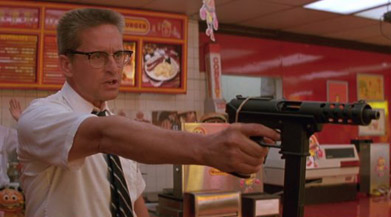|
|
Viking Night: Falling DownBy Bruce HallJune 13, 2012
William Foster (Michael Douglas) cracks up right before our eyes. We see a middle-aged white man in horn rimmed glasses stewing in a good old fashioned southern California traffic jam. As the camera pans around him, we find out almost everything we need to know about him. His haircut is 25 years out of date. There's an American flag in the background, and a telltale parking permit in his window. The sounds emanating from the cars around him hint at unruly kids, immigrants, and loud people on what passed for cell phones in 1993. A cynic would say you can almost hear society breaking down. A skeptic would say there's no hope, no reason to go on living the same way anymore. Well, Foster is both of those things. So without warning, he steps from his car and wanders across the freeway - off the grid and into a wonderland of insanity. We've all felt like doing this at one point or another, but you and I know there would be consequences. Foster knows this too. He just gives exactly zero shits about it. At the same time, grizzled detective Martin Prendergast (Robert Duvall) happens to be stuck in his own car about 30 meters away, and he's got problems of his own. Like most movie cops, he's one day away from retirement. Like most movie cops, he blames himself for the death of a precocious child. His wife is a shrill, controlling harpy and because of this, most of his peers think he's a coward. Still, he maintains a Zen-like comportment. He's conflicted about retirement, as though he knows he's destined for great things. So it's really no coincidence when Prendergast takes it upon himself to help move Foster's car from the road. Their stories remain intertwined until the very end of the film. Meanwhile, Foster gets himself into trouble at a Korean grocer when he tries to make change for a phone call and ends up taking a socio-political stand by redecorating the place with a baseball bat. It’s a little jarring, and at this point in the movie you can be forgiven for thinking you're looking at a bigoted sociopath. Things get more complex as Foster unleashes a 55 gallon drum of Crazy White Man on a pair of gang members who stop him on his way through the Barrio.
|

|
|
|

|
Friday, November 1, 2024
© 2024 Box Office Prophets, a division of One Of Us, Inc.


